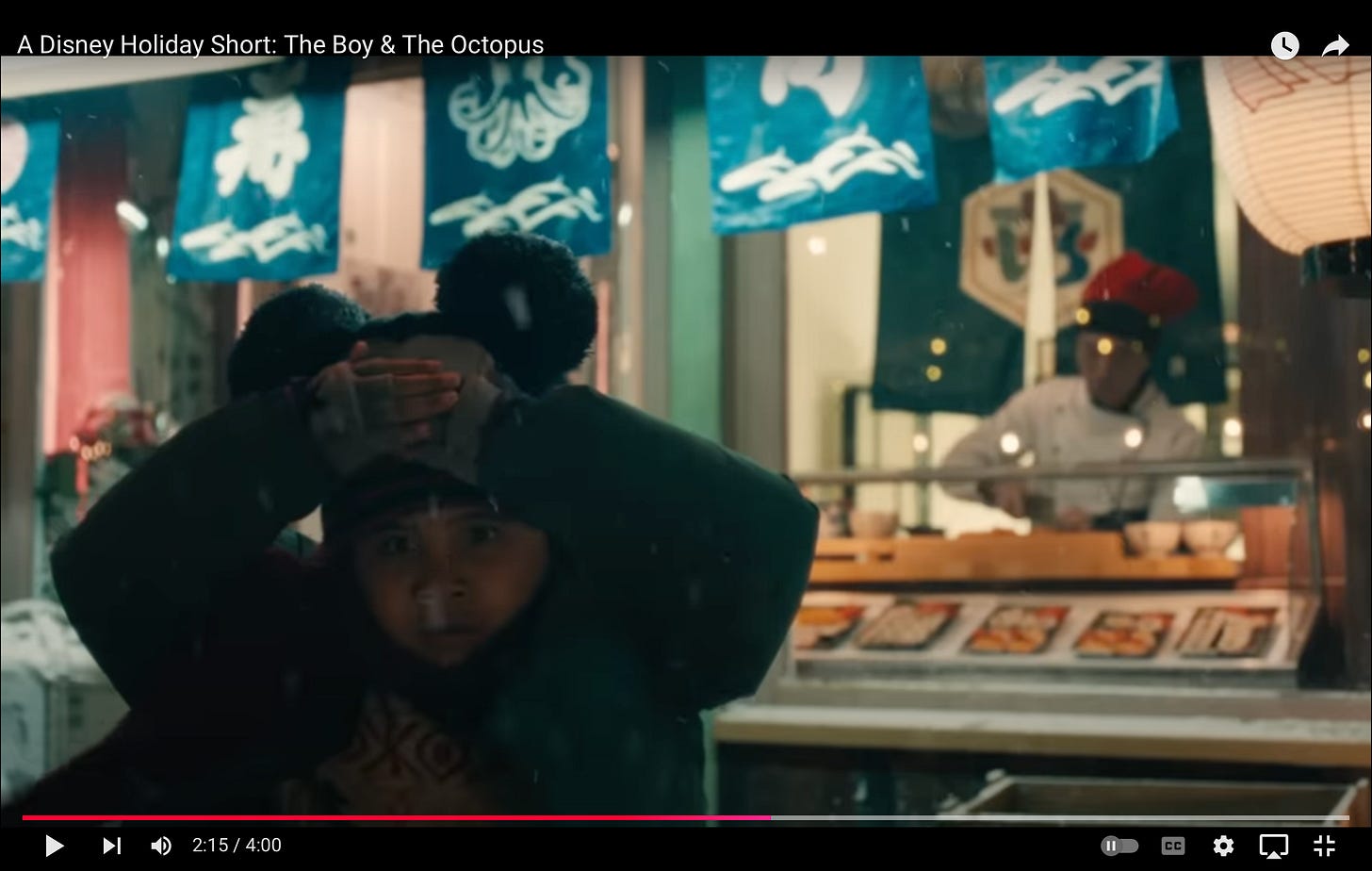The Cultural Cognitive Dissonance in our Relationship with Non-Humans
Do we recognize the choices we're making?
“Clear thinking and communicating about nature and human nature is literally a matter of life and death.” - Gustav Metzger, artist, in an interview with Hans Ulrich Obrist, curator (Hauser & Wirth Publishers, September 2024)
My running hypothesis on the state of humanity is that we all have so much going on - even if much of it is self-manufactured - that we don’t really have time to think about what’s actually going on.
The latest example of this landed right in my wheelhouse - where culture meets nature - this morning. The space where the things we create and share meet the natural world we sprung out of.
Actor, writer and director Taika Waititi created a new winter holiday-themed short film for Disney about the relationship between a real-life boy and an animated octopus.
We enter the film on a beautiful beach. A mom watches as a young boy straps on a pair of yellow goggles and dives into crystal-clear blue water. Below the surface, he comes face to face with an orange and yellow-speckled tiny octopus with the same big eyes that have led us to fall in love with every non-human animal in Disney’s extensive library of animated films. The boy screams and exits the water.
The boy reaches his mother’s lounge chair on the beach and the brightly-colored octopus emerges from the back of the boy’s dark hair-covered head like a sun rising. The mom screams.
The family returns to a snow-covered townhouse and the boy throws his bag on the ground before discovering the octopus is under the hood of his sweatshirt. The pair play with the boy’s toys and take a selfie while the octopus makes guttural noises suggesting interest and curiosity. The boy then cuts out the eyes in his Mickey Mouse beanie (an elegant brand integration that makes the marketer in me jealous) and we see him slide it over his head and the octopus as they head out to explore the town in a way that both can see and stay warm.
The pair return home, watch a Disney holiday film and the octopus departs with Santa on his sleigh to the delight of the boy looking out his window.
It’s a beautiful four minute film. And it highlights what a lot of people love about nature and non-human animals. Just yesterday, I was recording a podcast episode for Ecosystem Member with the artist Jenny Kendler, who shared her desire as a child to befriend a squirrel. The boy’s relationship with the octopus is the same sort of relationship we share with our cats and dogs and guinea pigs and a number of other non-human animals we’ve domesticated.
Yet, having worked in marketing and advertising for 17 years, I am a bit cynical. I know where to look these days when I want to poke holes in seemingly genuine artistic endeavors backed by corporate America, in particular when it comes to affection for the more-than-human world.
Pictured above is a charred octopus dish with a fennel salad. It costs $19. It is available at the restaurant Amare at the Walt Disney World Swan Reserve hotel. Disney also has an Izakaya at the iconic EPCOT center, which serves Tako (Octopus) Nigiri for $7 for two pieces and a Takoyaki (fried batter filled with Octopus) for $10.
This is not an argument for or against eating non-human animals.
This is a yellow highlighter on the cognitive dissonance in our cultural and commercial creations when it comes to our relationship with nature and the more-than-human world.
Taika has created a heart-warming film that shows how incredible of a storyteller he is. He even highlights this key tension in the film by showing the boy covering the eyes of the octopus when they pass a sushi shop in the town in the film. We can see and feel that the boy is horrified when he accidentally shows his new friend a restaurant that literally serves the octopus and its kind on a plate. And this is nothing new. You can find plenty of reaction videos on social media and YouTube showing children when they find out they are eating a chicken or a pig or a cow.
The cognitive dissonance of Disney to commission a film highlighting an anthropomorphized relationship between a boy and an octopus, while still serving octopus at its theme parks and hotels is pretty mind-blowing. As a business, Disney recognizes the power of this human/non-human relationship to connect people with its business and brand, and it also recognizes that most people are not going to make the connection between the octopus in the film Disney serves them and the octopus on the plate Disney serves them. The prevailing cultural insistence is actually showcasing the limits of our adult imaginations by suggesting that only children can form these type of bonds. We’ll grow out of it when we get older.
From where I sit, this situation represents the lack of clear thinking that Gustav Metzger warns us about.
If human nature really is to consume non-human animals - as some would have you believe - then why do non-human animals feature so prominently in films, particularly animated ones aimed at children? Why bother forming these bonds and emotional ways of viewing non-human animals if we need to eat them to survive? Why are we Finding Nemo, rather than Hunting Nemo?
I don’t know the answer, but I do know our culture is being clouded by commerce. And commerce is an especially relevant frame to look at our relationship with the octopus.
In recent years, businesses have launched to farm octopus for human consumption. This is despite mounds of scientific research that shows how unique the octopus is. To put it simply, scientists know that octopuses are quite ‘intelligent’ or ‘smart’ but because we can only really understand intelligence through a human framework, we don’t really know exactly how smart or intelligent they are.
I often tell friends, I think of an octopus like an extraterrestrial alien in a film. There are certain things we think we can connect with them on, like the eyes (with acknowledged allusions to the art historical gaze). And there are other things - like tentacles and wet skin and a different kind of brain - that freak us out.
Extraterrestrial aliens are actually a really good way to examine this cultural dissonance.
If a flying saucer landed in someone’s backyard in Kansas tomorrow, would the beings who emerge find it weird that the same organization that makes a film for children about connecting with an octopus also serves octopus to those same children as food?
If you agree with this post, please share it with others. If you disagree and think I am an idiot, don’t forget to share it to show how wrong I am and right you are.







Another thing is I wonder/worry what organisms think/feel ??? being betrayed by humans. If they find us a curiosity and reach out to figure whether friend or foe. then realize where predators - Isnt that betrayal??